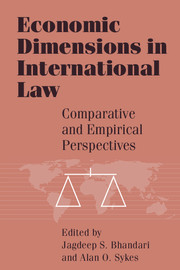Book contents
- Frontmatter
- Contents
- Preface
- Introduction: Economics and international law
- 1 The economics of the most favored nation clause
- 2 The economics of “injury” in antidumping and countervailing duty cases
- 3 The economics of “injury” in antidumping and countervailing duty cases: A reply to Professor Sykes
- 4 Innovations in support of the unitary injury test in U.S. unfair trade cases
- 5 The free trade–fair trade debate: Trade, labor, and the environment
- 6 International conflict and coordination in environmental policies
- 7 Market modernization of law: Economic development through decentralized law
- 8 Toward a positive theory of privatization: Lessons from Soviet-type economies
- 9 New stories on exchange rate policies in transition
- 10 Is deposit insurance inevitable? – lessons from Argentina
- 11 The market for migrants
- 12 The interplay of liquidation and reorganization in the bankruptcy systems of Canada and the United States: The role of screens, gatekeepers, and guillotines
- 13 International political economy approaches to international institutions
- 14 The trade effects of domestic antitrust enforcement
- 15 The Hartford Insurance Company case: Antitrust in the global economy – welfare effects and sovereignty
- 16 Recognition of foreign judgments as a trade law issue: The economics of private international law
- 17 Externalities and extraterritoriality: The law and economics of prescriptive jurisdiction
- Index
8 - Toward a positive theory of privatization: Lessons from Soviet-type economies
Published online by Cambridge University Press: 05 December 2011
- Frontmatter
- Contents
- Preface
- Introduction: Economics and international law
- 1 The economics of the most favored nation clause
- 2 The economics of “injury” in antidumping and countervailing duty cases
- 3 The economics of “injury” in antidumping and countervailing duty cases: A reply to Professor Sykes
- 4 Innovations in support of the unitary injury test in U.S. unfair trade cases
- 5 The free trade–fair trade debate: Trade, labor, and the environment
- 6 International conflict and coordination in environmental policies
- 7 Market modernization of law: Economic development through decentralized law
- 8 Toward a positive theory of privatization: Lessons from Soviet-type economies
- 9 New stories on exchange rate policies in transition
- 10 Is deposit insurance inevitable? – lessons from Argentina
- 11 The market for migrants
- 12 The interplay of liquidation and reorganization in the bankruptcy systems of Canada and the United States: The role of screens, gatekeepers, and guillotines
- 13 International political economy approaches to international institutions
- 14 The trade effects of domestic antitrust enforcement
- 15 The Hartford Insurance Company case: Antitrust in the global economy – welfare effects and sovereignty
- 16 Recognition of foreign judgments as a trade law issue: The economics of private international law
- 17 Externalities and extraterritoriality: The law and economics of prescriptive jurisdiction
- Index
Summary
In Western countries the privatization phenomenon suggests some tension, if not a paradox, in positive theories of public choice. Many, although not all, accounts of how the government takes over a function from the private sector, whether by direct ownership or through pervasive regulation, incorporate a tale of rent seeking by discrete interest groups, either within the state (bureaucrats) or without (clients). But most accounts of privatization, whether by divestment or deregulation, assume that decision makers are public-regarding, in the sense that the story treats the choice to privatize as motivated by a search for optimal production of the good at issue.
At least some analysts recognize the implicit contradiction and attempt to explain why government can facilitate rent seeking on some occasions and counter it on others. One plausible reconciliation of these opposing perspectives is that in democratic societies, governmental decision makers get mixed signals due to a dynamic political process. Interest groups can steal a march on the general public due to their informational advantages and lower organizational costs, but a process of exposure and political competition can induce politicians, and the bureaucrats who answer to them, to put an end to some instances of rent seeking.
But then what explains privatization in Soviet-type economies? In those countries, does the decision to transfer firms from the state sector to the private stem primarily from a conversion to a new faith about how to attain a good and just society?
- Type
- Chapter
- Information
- Economic Dimensions in International LawComparative and Empirical Perspectives, pp. 324 - 369Publisher: Cambridge University PressPrint publication year: 1998
- 1
- Cited by



